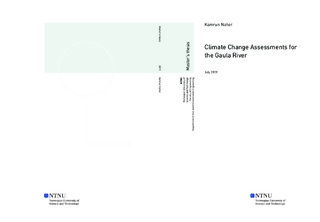| dc.description.abstract | The effects of climate change were assessed for Gaula, south of Trondheim in Norway as a wetting winter and drying summer are predicted to occur in the future. The research was done in six steps to find the effect of a warming climate in Gaula. Ten climate models with two emission scenarios were used since there is uncertainty in both natural and anthropogenic changes. Periods 2040-2069 and 2070-2099 were compared with period 1976-2005 and the climate data was downloaded from https://nedlasting.nve.no/klimadata/kss.
In the beginning, the climate model’s data was checked with the observed data and then the climate data was used to obtain future changes in precipitation, temperature and runoff. For all scenarios, it was found that the precipitation, temperature and runoff are increasing. Summer precipitation increase is extreme, and the runoff is changing seasonally. An increasing precipitation will lead to frequent floods and temperature rise to droughts. The spring peak is reduced and moved. Compared to the control period the increase in annual runoff is not so high 0.9, 4.7, 2.7 and 5.6% for RCP4540, RCP4570, RCP8540 and RCP8570 respectively. Snowpack reduction (70%) is highest for RCP8570 due to high air temperature.
Future runoff was scaled and taken to the nMAG model to find the effect of climate change on Lundesokna power plant in the current strategy. The result achieved showed that there is a small increase in annual power production for future climate scenarios. However, the annual change in inflow is zero and the production is increasing in winter and decreasing in summer following the higher winter flow and lower summer flow. Sama power plant will be benefited most among the other power plants (maximum 8.84% annual increase for RCP8570).
To observe the effect of drying summer and wetting winter, January 5 percentile and July 25 percentile flow were simulated in HEC-RAS5.0.6. The reach was selected from Haga bru station to Trondheim fjord and a steady flow analysis was done to observe the drying and wetting conditions in Gaula. Results obtained showed that drying summer and wetting winter have effects on the river and these drying areas will lead to vegetation, fish migration problems, water quality deterioration in the future. High flow in winter might improve the salmon fish conditions, still there is uncertainty regarding other species and chemical processes in the river.
Water temperature in Gaula was measured only for RCP8570. The average temperature is increasing in water by 1.97oC for RCP8570 compared to the control period. Minimum summer temperature obtained from this research is 6.8oC in future whereas for the control period it is 0.6oC. Increasing water temperature has many impacts regarding species in the river and agricultural problems.
Summarizing the results, it can be said that, Gaula is having a different hydrograph in future climate and snowpack is reducing tremendously. Since tourism and recreational activities in Norway depend on snow, this might affect severely. The increasing runoff will give higher production for hydropower in present strategies. In contrast to that, future consumption and electricity price would be different, thus the power company needs to take adaptive strategies in the future. Though in winter, increasing runoff might improve the salmon fishing in Gaula, there remains uncertainty in the water quality for both summer and winter since both low and high flows have their changing capability to the aquatic ecosystem in different ways.
Nevertheless, further research is recommended on the power production using adaptive strategies and also for the ecosystem change in Gaula since the ecosystem has a great influence on the aquatic species, agriculture, recreation, human health, etc. | |
